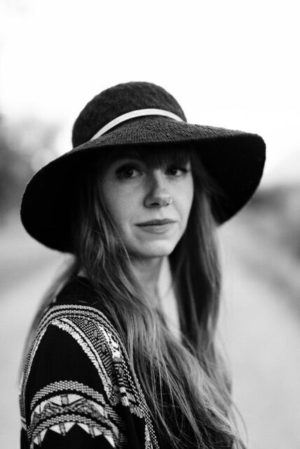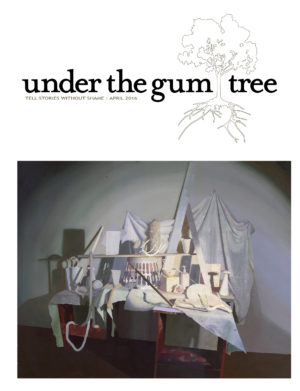Delaney Kochan

Delaney Kochan is a mountain-raised writer whose love languages are cut flowers and thunder storms. She has published work in multiple collegiate literary magazines and guest-writes for outdoor adventure and youth ministry blogs. She started a lifestyle brand and magazine with her friends in college and now works finding and telling stories of missionaries serving in Europe. She loves language, and on the weekends she pretends she can paint.
When did you start writing and why? What inspires your writing now?
Many people begin writing because they feel a need to tell a story, but my first love was language. I grew up an avid reader and hesitant writer, but the pivotal moment of deciding to make language a life-long passion came my senior year of high school when my class read James Joyce’s Portrait of the Artist as a Young Man. The evolution of Stephen’s language, the fragmented thoughts, the musical quality of the book, captured me. I actually stole that book from my school. After reading the first chapter, I started marking the text, knowing it’d be staying with me after we finished studying in class.
Beautiful language still inspires me. But my inspiration has broadened since then, and I’d say that it is beauty that inspires me. Beauty and truth and the human experience. I want to make my own experience of life and others’ experience more vibrant and full and real. To misappropriate a line from T. S. Eliot’s The Dry Salvages, “We had the experience but missed the meaning.” I think writing helps me sit with life and put shape to it—bring color and a physicality to our thoughts and experiences.
Your piece is very short. How did you go about writing an impactful brief piece of nonfiction? How is it different than writing a longer piece?
My writing-roots are in poetry. Beginning my creative-writing education in poetry formed strong values of precise diction and hard-working images in me. Both of these things are crucial to writing an impactful piece in few words. Editing has become a favorite part of the writing process for me. You have to get the whole thing down first, but the crafting of words into a particular map or lyric for the reader is the fun part for me. Learning to say exactly what you mean and choosing your words carefully is a lost art I aim to bring back.
In writing longer pieces, I’d value all the same things, but you are allowed more variety of pacing when you write them. You have to pay particular attention to energy in flash nonfiction. It is a snapshot of a moment or thought rather than the full thing.
In your opinion what criteria does an event have to meet to make a decent subject for a creative nonfiction piece?
That it sticks with you. That it has something to offer. And I think most moments do. It is up to you as the writer to rightly convey what that event marks in the world or in your own soul.
Clearly being the daughter of an Army Ranger had a profound impact on you, can you put into words how that has influenced how you live your life and perceive the world?
My father was actually out of the military by the time he and my mom started a family, but we lived in a military town with multiple bases and installations, a military academy, and prep-schools. Consequently, there was, and is, a culture of sacrifice and honor that runs deep here. Sometimes the concepts of sacrifice and honor are misunderstood even by the culture that circulates them. Both are beautiful things, but the difficult questions that life in the military brings up make morality very fluid at times.
Being raised in this culture, I’ve learned to hold very firmly to certain things I believe so blurry circumstances don’t have a chance to alter my morals. But I’ve also learned to hold very loosely to other things, knowing that my philosophy on something I’ve never experienced isn’t the whole picture and I need enough humility to listen to others if I ever want to mature as a person.
Growing up, it was my friends’ parents who served. Now its my own friends, men I’ve dated, and the parents of kids I mentor. People I care for have counted their individual life’s value less than the freedom and safety of their tribe. They have committed to valuing the whole above themselves. I believe everyone should live this way, caring so deeply for others that you value their wellbeing above your own. But the danger that this kind of living implies for those who choose military life is often more immediate than for someone who hasn’t. And that is where my philosophy on living comes into tension with my desire for the military men and women I care to be safe and be well. It’s complicated and hard and emotional. I felt that tension echoed in American Sniper which is part of the reason I was drawn to writing about it.
How impactful do you think it is to hear others’ stories and life experiences?
So impactful! We all come with biases and are limited to our own place in time and space, but there is so much more truth and life to the world than what we get to experience on our own. Hearing others’ wisdom and experiences is one of the greatest gifts we get from our ability to tell stories.
Explain why you were most sympathetic with Kyle’s wife and not Kyle himself after watching the movie.
It was simply because I can relate to her more than I can Kyle. My life experience so far is much more like the one left at home to worry over her loved-one, the one who struggles with how to courageously and compassionately engage the hurt and trauma that come as a consequence of violence. It is something I am immensely passionate about: learning how to deal with people’s emotions, fears, hurt, with grace. How you do this—how you love them—speaks to people about their worth.




